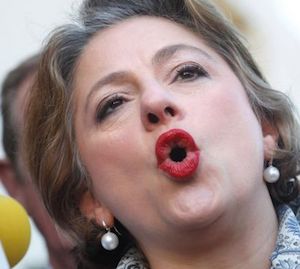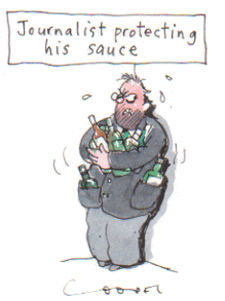April 25 to May 1 … Brandis' backflip on CLC funding … ACT pilot justice reinvestment program ... Sophie Mirabella sues … Journalists bewildered by AFP metadata breach ... Week@theKnees with Sohini Mehta
 ATTORNEY GENERAL George Brandis was joined by Minister for Women Michaelia Cash on Monday (April 24) morning at the Women’s Legal Service at Annerley to announce a $55.7 million federal funding injection to keep the community legal sector afloat, including $16.7 million for Aboriginal and Torres Strait Islander legal services.
ATTORNEY GENERAL George Brandis was joined by Minister for Women Michaelia Cash on Monday (April 24) morning at the Women’s Legal Service at Annerley to announce a $55.7 million federal funding injection to keep the community legal sector afloat, including $16.7 million for Aboriginal and Torres Strait Islander legal services.
$39 million of the funding will be given to community legal centres, which faced a $35m funding cliff from July 1.
As recently as late last month, Brandis maintained that Commonwealth funding to the sector had not been cut.
Brandis credited his last-minute change of heart to the vigorous advocacy of the legal profession. On Monday he said:
"The legal profession, in aggregate, has been active and influential in engaging with the government and once again it is as a result of that engagement that these decisions ... have been made."
Eager for a pat on the back, Brandis said the allocation would give the sector certainty and represented the largest single annualised Commonwealth commitment to it, ever.
The pre-budget announcement was intended to give the chronically underfunded sector "as much notice as possible" before June 30.
With cuts first unveiled in December 2013, members of the legal community might reasonably believe the reversal is long overdue. But many have opted to be kind.
"It is worth celebrating the finding of this money," Law Council president Fiona McLeod told The Saturday Paper.
Brandis has written to the state and territory attorney generals, urging those who had increased their allocations as a stopgap to retain them and for others to do more. He said:
"Nobody can say the Commonwealth hasn’t stepped up to the plate and we look to the states to do the same."
NSW attorney general Mark Speakman said the $6 million rescue package to community legal centres would still be provided but the state government would wait to see the detail of the federal announcement before deciding where the $6 million would be most needed.
* * *
The Australian Capital Territory will trial a 12-month justice reinvestment program in an attempt to lower rates of Indigenous incarceration.
The ACT has one of the highest rates of Indigenous incarceration per capita in the country, after WA and the NT: Aboriginal and Torres Strait Island people in the ACT are jailed at a rate of 2,266 per 100,000.
The new Yarrabi Bamirr program, denoting "walk tall" in the Ngunnawal language, will intensively support 10 young families already enmeshed in the criminal justice system with the aim of addressing the social and cultural drivers of crime.
$367,000 of the $926,000 program will fund additional social health workers, as well as the Aboriginal Legal Service, Domestic Violence Crisis Service and an Aboriginal police liaison officer.
ACT justice and corrections minister Shane Rattenbury said "we have to be willing to take a risk and do things differently" to counter Indigenous overrepresentation in the prison population.
The ACT prison population will exceed capacity within three years if it continues growing at its current rate.
* * *
 Mirabella: reputation damaged Former Liberal MP Sophie Mirabella is suing the regional Victorian weekly Benalla Ensign and its editor, Libby Price, in the Victoria county court over an April 2016 article.
Mirabella: reputation damaged Former Liberal MP Sophie Mirabella is suing the regional Victorian weekly Benalla Ensign and its editor, Libby Price, in the Victoria county court over an April 2016 article.
In a writ filed on 19 April, Mirabella, who lost the Indi seat to independent MP Cathy McGowan in 2013, says the article is defamatory because it said Mirabella had pushed McGowan out of the way of a photograph "for her own political reasons". The statement of claim said:
"Ms Mirabella has been seriously injured in her feelings, her career and in her reputation both personally, as a politically active participant in the public arena and in her role within the community of north-east Victoria."
The story was published in print and online by the Ensign during the 2016 election campaign, in which Mirabella unsuccessfully attempted to win back the seat from McGowan.
Mirabella seeks aggravated damages over the story, claiming its publishers were "recklessly indifferent" to the truth; made inadequate inquiries about the story; and failed to contact the relevant witnesses present at the event in question.
A day after the article was published on April 20, 2016, Mirabella's office broadcast to other media outlets that the reported physical contact hadn't taken place. But the newspaper only acknowledged their "mistake" and withdrew the allegations in October 2016, months after the federal election, Mirabella says in her writ.
Price formerly hosted the Victorian edition of the ABC's The Country Hour and now edits the Ensign, with a readership of about 4,000.
* * *
 At a Canberra press conference on Friday (April 28) afternoon, Australian federal police commissioner Andrew Colvin admitted an officer unlawfully accessed a journalist's call records held under the government's metadata retention regime.
At a Canberra press conference on Friday (April 28) afternoon, Australian federal police commissioner Andrew Colvin admitted an officer unlawfully accessed a journalist's call records held under the government's metadata retention regime.
Under amendments to telecommunications laws in 2015, this should've required the AFP commissioner or a senior manager to obtain a "journalist information warrant".
The AFP notified the commonwealth ombudsman on Wednesday (April 26), and her office is now conducting an investigation.
The officer hasn’t been disciplined or suspended.
"Put simply, this was human error," Colvin said. "I don't believe there was ill will or bad intent here."
Human Rights Law Centre legal advocacy director Emily Howie told Guardian Australia:
"The fact that police can so easily access a honey pot of personal information at any time surely has a chilling effect on free speech," and branded Australia’s metadata regime "the most oppressive in the western world."
Tim Singleton Norton, chairman of Digital Rights Watch, took aim at the decision not to notify the journalist involved - owing, purportedly, to the sensitivity of an ongoing investigation.
"The entire journalism community is now wondering are they at risk, are their sources at risk?" he told Guardian Australia.
Journalist Paul Farrell reported that the question of the night at Australia’s impeccably timed annual press freedom dinner on Friday was: "Is it you?"
Two years ago - prior to the introduction of the 2015 warrant requirements - the AFP accessed Farrell's phone and email records in the course of an investigation into sources for a story about the government’s asylum seeker turnback operations.